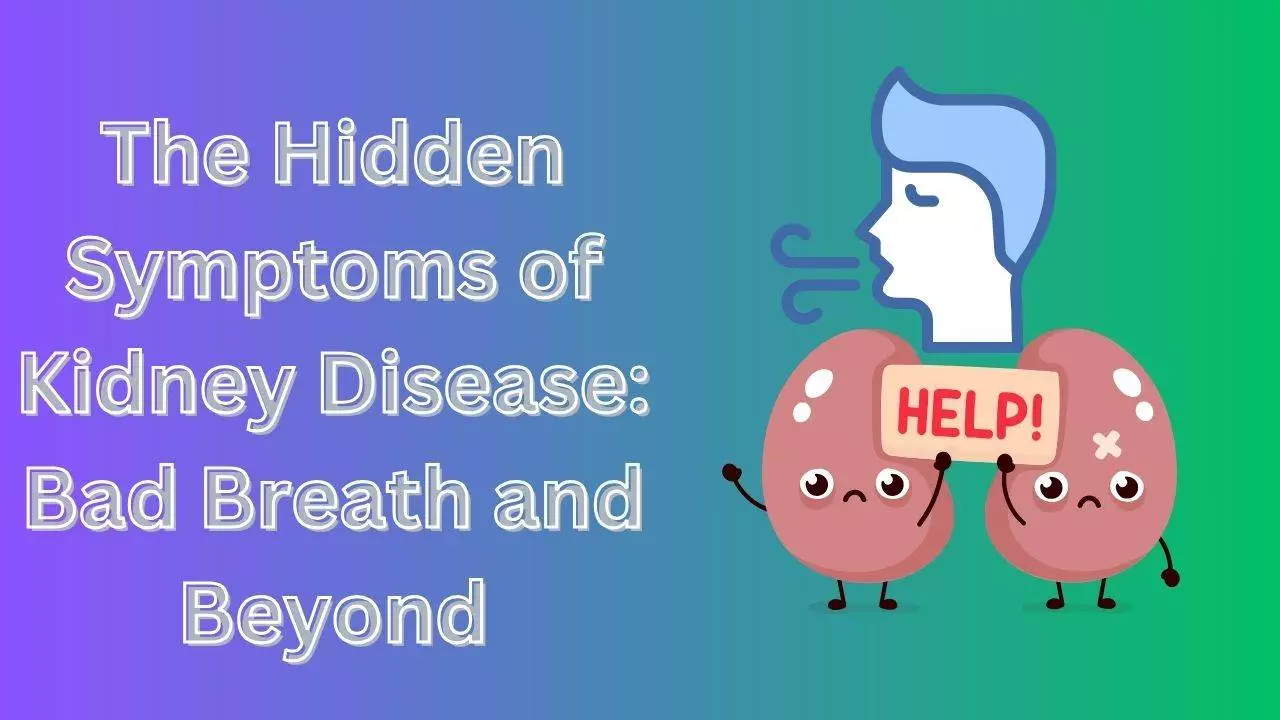
- Bad Breath: A Surprising Symptom of Kidney Disease
- How Kidney Disease Causes Bad Breath: The Science Behind It
- Other Oral Symptoms of Kidney Disease: Dry Mouth, Metallic Taste, and More
- Skin Problems and Kidney Disease: Rashes, Itching, and More
- Kidney Disease and Urinary Symptoms: Changes in Urine Color, Frequency, and More
- Fatigue and Weakness: A Common Symptom of Kidney Disease
- Nausea and Vomiting: How Kidney Disease Affects Your Digestive System
- Cognitive Changes: Memory Loss, Confusion, and More
- Mood Changes: Anxiety, Depression, and More
- Recognizing the Hidden Symptoms of Kidney Disease and Seeking Treatment Early
Kidney disease, also known as renal disease, is a condition that affects the functioning of the kidneys. The kidneys play a crucial role in filtering waste products and excess fluid from the blood, maintaining electrolyte balance, and producing hormones that regulate blood pressure. When the kidneys are not functioning properly, waste products and toxins can build up in the body, leading to a range of symptoms and complications.
Recognizing the symptoms of kidney disease early is important because it allows for prompt diagnosis and treatment. If left untreated, kidney disease can progress and lead to kidney failure, which requires dialysis or a kidney transplant to sustain life. By understanding the symptoms associated with kidney disease, individuals can seek medical attention and receive appropriate treatment before the condition worsens.
Bad Breath: A Surprising Symptom of Kidney Disease
One surprising symptom of kidney disease is bad breath, also known as halitosis. Bad breath can be caused by a variety of factors, including poor oral hygiene, certain foods, smoking, and dry mouth. However, in some cases, bad breath can be an indication of an underlying health condition such as kidney disease.
When the kidneys are not functioning properly, toxins and waste products can accumulate in the body. These toxins can be released through the breath, resulting in a foul odor. Additionally, individuals with kidney disease may experience dry mouth, which can further contribute to bad breath.
It is important not to ignore bad breath as it could be a sign of an underlying health issue. If you are experiencing persistent bad breath that does not improve with oral hygiene practices such as brushing and flossing, it is recommended to consult with a healthcare provider for further evaluation.
How Kidney Disease Causes Bad Breath: The Science Behind It
The connection between kidney disease and bad breath lies in the buildup of toxins in the body. Normally, the kidneys filter waste products and toxins from the blood, which are then excreted in the urine. However, when the kidneys are not functioning properly, these waste products can accumulate in the body.
One of the waste products that can build up in individuals with kidney disease is urea. Urea is normally excreted in the urine, but when the kidneys are not functioning properly, it can accumulate in the blood. Urea is broken down by bacteria in the mouth, resulting in the release of ammonia, which has a strong odor.
In addition to urea, other waste products such as creatinine and phenols can also contribute to bad breath. These waste products can be released through the breath, leading to an unpleasant odor. It is important to note that bad breath alone is not enough to diagnose kidney disease, but it can be a clue that further evaluation is needed.
Other Oral Symptoms of Kidney Disease: Dry Mouth, Metallic Taste, and More
In addition to bad breath, kidney disease can cause other oral symptoms that should not be ignored. One common symptom is dry mouth, also known as xerostomia. Dry mouth occurs when there is a decrease in saliva production, which can lead to discomfort and difficulty speaking or swallowing.
Dry mouth can be caused by a variety of factors, including medications, dehydration, and certain medical conditions such as kidney disease. When the kidneys are not functioning properly, electrolyte imbalances can occur, which can affect saliva production.
Another oral symptom that can indicate kidney disease is a metallic taste in the mouth. This metallic taste is often described as a bitter or sour taste that persists even after eating or drinking. The exact cause of this metallic taste is not fully understood, but it is believed to be related to the buildup of toxins in the body.
If you are experiencing any of these oral symptoms along with bad breath, it is important to discuss them with a healthcare provider. They can help determine the underlying cause and recommend appropriate treatment options.
Skin Problems and Kidney Disease: Rashes, Itching, and More
Kidney disease can also affect the skin, leading to a variety of symptoms and complications. One common skin symptom of kidney disease is itching, also known as pruritus. Itching can occur due to the buildup of waste products in the blood, which can irritate the skin.
In addition to itching, individuals with kidney disease may also experience dry skin, rashes, and changes in skin color. These skin problems can be caused by a variety of factors, including electrolyte imbalances, hormonal changes, and impaired blood flow to the skin.
It is important not to ignore these skin symptoms as they can be indicative of an underlying health issue such as kidney disease. If you are experiencing persistent itching or other skin problems, it is recommended to consult with a healthcare provider for further evaluation.
Kidney Disease and Urinary Symptoms: Changes in Urine Color, Frequency, and More
The kidneys play a crucial role in the urinary system, so it is not surprising that kidney disease can affect urinary function. One common urinary symptom of kidney disease is changes in urine color. Healthy urine is typically pale yellow to amber in color, but individuals with kidney disease may notice that their urine is darker or has a foamy appearance.
Frequent urination or increased urgency to urinate can also be a symptom of kidney disease. This occurs because the kidneys are not able to properly regulate fluid balance in the body, leading to an increase in urine production.
In addition to changes in urine color and frequency, individuals with kidney disease may also experience blood in the urine, also known as hematuria. Hematuria can occur due to damage to the blood vessels in the kidneys or urinary tract.
If you are experiencing any of these urinary symptoms along with other symptoms of kidney disease, it is important to seek medical attention. A healthcare provider can perform tests to determine the underlying cause and recommend appropriate treatment options.
Fatigue and Weakness: A Common Symptom of Kidney Disease
Fatigue and weakness are common symptoms of kidney disease and can significantly impact a person’s quality of life. These symptoms can occur due to a variety of factors, including anemia, electrolyte imbalances, and buildup of toxins in the body.
One of the main causes of fatigue and weakness in individuals with kidney disease is anemia. Anemia occurs when there is a decrease in red blood cells or hemoglobin, which are responsible for carrying oxygen to the body’s tissues. When the kidneys are not functioning properly, they may not produce enough erythropoietin, a hormone that stimulates red blood cell production.
In addition to anemia, electrolyte imbalances can also contribute to fatigue and weakness. The kidneys play a crucial role in maintaining electrolyte balance in the body, but when they are not functioning properly, imbalances can occur. These imbalances can affect muscle function and lead to fatigue and weakness.
If you are experiencing persistent fatigue and weakness, it is important to discuss these symptoms with a healthcare provider. They can help determine the underlying cause and recommend appropriate treatment options.
Nausea and Vomiting: How Kidney Disease Affects Your Digestive System
Kidney disease can also affect the digestive system, leading to symptoms such as nausea and vomiting. These symptoms can occur due to a variety of factors, including electrolyte imbalances, buildup of toxins in the body, and impaired digestion.
One common cause of nausea and vomiting in individuals with kidney disease is uremia. Uremia occurs when waste products such as urea build up in the blood due to impaired kidney function. These waste products can irritate the lining of the stomach and intestines, leading to nausea and vomiting.
In addition to uremia, electrolyte imbalances can also contribute to nausea and vomiting. The kidneys play a crucial role in maintaining electrolyte balance in the body, but when they are not functioning properly, imbalances can occur. These imbalances can affect digestion and lead to gastrointestinal symptoms.
If you are experiencing persistent nausea and vomiting, it is important to discuss these symptoms with a healthcare provider. They can help determine the underlying cause and recommend appropriate treatment options.
Cognitive Changes: Memory Loss, Confusion, and More
Kidney disease can also affect cognitive function, leading to symptoms such as memory loss, confusion, and difficulty concentrating. These cognitive changes can occur due to a variety of factors, including electrolyte imbalances, buildup of toxins in the body, and impaired blood flow to the brain.
One common cause of cognitive changes in individuals with kidney disease is uremia. Uremia occurs when waste products such as urea build up in the blood due to impaired kidney function. These waste products can cross the blood-brain barrier and affect brain function, leading to cognitive symptoms.
In addition to uremia, electrolyte imbalances can also contribute to cognitive changes. The kidneys play a crucial role in maintaining electrolyte balance in the body, but when they are not functioning properly, imbalances can occur. These imbalances can affect brain function and lead to cognitive symptoms.
If you are experiencing persistent cognitive changes such as memory loss or confusion, it is important to discuss these symptoms with a healthcare provider. They can help determine the underlying cause and recommend appropriate treatment options.
Mood Changes: Anxiety, Depression, and More
Kidney disease can also affect mood and emotional well-being, leading to symptoms such as anxiety, depression, and irritability. These mood changes can occur due to a variety of factors, including electrolyte imbalances, buildup of toxins in the body, and hormonal changes.
One common cause of mood changes in individuals with kidney disease is electrolyte imbalances. The kidneys play a crucial role in maintaining electrolyte balance in the body, but when they are not functioning properly, imbalances can occur. These imbalances can affect brain function and lead to mood symptoms.
In addition to electrolyte imbalances, buildup of toxins in the body can also contribute to mood changes. When the kidneys are not functioning properly, waste products and toxins can accumulate in the body, which can affect brain function and lead to mood symptoms.
If you are experiencing persistent mood changes such as anxiety or depression, it is important to discuss these symptoms with a healthcare provider. They can help determine the underlying cause and recommend appropriate treatment options.
Recognizing the Hidden Symptoms of Kidney Disease and Seeking Treatment Early
In conclusion, recognizing the symptoms of kidney disease early is crucial for prompt diagnosis and treatment. Kidney disease can affect various systems in the body, leading to a range of symptoms that should not be ignored.
Some of the hidden symptoms of kidney disease include bad breath, dry mouth, metallic taste, skin problems, urinary symptoms, fatigue and weakness, nausea and vomiting, cognitive changes, and mood changes. These symptoms can be indicative of an underlying health issue such as kidney disease and should be discussed with a healthcare provider.
If you are experiencing any of these symptoms or have concerns about your kidney health, it is important to seek medical attention. A healthcare provider can perform tests to determine the underlying cause and recommend appropriate treatment options. By recognizing the hidden symptoms of kidney disease and seeking treatment early, individuals can improve their overall health and well-being.









